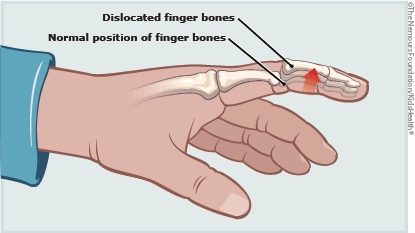Dislocated Finger: How to Care for Your Child
With proper treatment, most kids who dislocate a finger can gradually return to their normal activities. The finger may feel sore or stiff for a while.


A dislocation is when the bones in a joint slip out of their normal position. A finger dislocation may happen from a fall, blow, or sports injury, especially if the finger is bent back or jammed.
Your child had X-rays to diagnose the dislocated finger. The bones may have moved back into place on their own or the health care provider may have gently put the joint back with a quick maneuver called a reduction. In some cases, surgery is needed to repair the joint.
To keep the joint from dislocating again, the health care provider put a splint on the injured finger or taped it to the neighboring finger ("buddy taping"). Depending on the injury, your child will have a splint or taped fingers for a few days to a few weeks. The health care provider may also recommend gentle hand exercises to help strengthen the finger and reduce joint stiffness.

-
For the next few days:
-
Put a cold pack or plastic bag of ice wrapped in a towel on the finger for 15–20 minutes three or four times a day. Do not place ice directly on the skin.
-
To keep swelling down, your child should keep the hand raised above the heart as much as possible. Try propping it up with pillows.
-
If your child is uncomfortable, a medication may help:
-
For children under 6 months, you may give acetaminophen.
-
For children over 6 months, you may give acetaminophen OR ibuprofen, if recommended by your health care provider.
-
If your health care provider recommended hand or finger exercises, your child should do them as instructed.
-
If your child has a splint, follow your health care provider's instructions for taking care of it. Do not try to remove or adjust it unless instructed by your health care provider to do so.
-
If your child has buddy tape, remove the tape and replace it as you were shown each day or anytime it becomes wet or soiled. Have your child use a hand sanitizer to clean hands except for when visibly dirty and washing is needed.

-
Schedule a follow-up appointment with the orthopedic doctor (bone specialist) as directed.
-
Ask your health care provider when it's OK for your child to return to sports. The health care provider may recommend protective hand gear or taping for sports play.

-
The finger dislocates again.
-
Pain doesn't improve with medication.
-
Swelling doesn't improve with propping the hand up.
